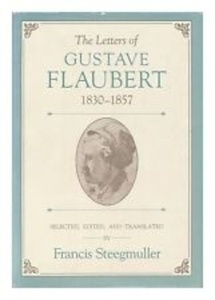The Letters of Gustave Flaubert, 1830-1857

Editorial Harvard University Press
Fecha de edición febrero 1980 · Edición nº 1
Idioma inglés
EAN 9780674526365
270 páginas
Libro
encuadernado en tapa dura
Resumen del libro
Gustave Flaubert wrote to his mistress, Louise Colet: 'An author in his book must be like God in the universe, present everywhere and visible nowhere.' In his books, Flaubert sought to observe that principle; but in his many impassioned letters he allowed his feelings to overflow, revealing himself in all of his human complexity. Sensuous, witty, exalted, ironic, grave, analytical, the letters illustrate the artists life'and they trumpet his artistic opinions'in an outpouring of uninhibited eloquence. An acknowledged master of translation, Francis Steegmuller has given us by far the most generous and varied selection of Flauberts letters in English. He presents these with an engrossing narrative that places them in the context of the writers life and times. We follow Flaubert through his unhappy years at law school, through his tumultuous affair with Louise Colet; we share his days and nights amid the temples and brothels of Egypt, then on to Palestine, Turkey, Greece, and Rome. And the letters chronicle one of the central events in literary history'the conception and composition of what has been called the first modern novel, Madame Bovary. Steegmullers selection concludes with Flauberts standing trial for immoral writing, Madame Bovarys immediate popular success, and Baudelaires celebration of its psychological and literary power. Throughout this exposition in Flauberts own words of his views on life, literature, and the passions, readers of his novels will be powerfully reminded of the fertility of his genius, and delighted by his poetic enthusiasm. 'Let us sing to Apollo as in ancient days,' he wrote to Louise Colet, 'and breathe deeply of the fresh cold air of Parnassus; let us strum our guitars and clash our cymbals and whirl like dervishes in the eternal hubbub of forms and ideas!' Flauberts letters are documents of life and art; lovers of literature and of the literary adventure can rejoice in this edition.
Biografía del autor
Gustave Flaubert (1821-1880) no fue sólo un magistral adelantado de la modernidad, sino que fue también gran contador de historias, prodigioso captador de ambientes y extraordinario creador de caracteres. Además de "Madame Bovary", entre sus obras cabe destacar "La educación sentimental", "Salambó" y "Tres cuentos", obras todas ellas publicadas en Alianza Editorial.








